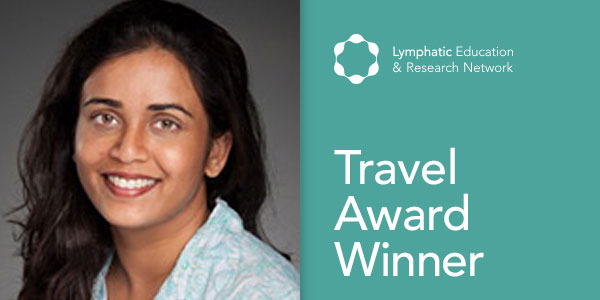This is a guest blog post by Ethel Pereira, Ph.D. Dr. Pereira is at Massachusetts General Hospital and Harvard Medical School, Boston, under the supervision of Dr. Tim Padera. Dr. Pereira received a LE&RN Travel Award in 2018 to attend the GRC Lymphatics conference in Italy. Research in the Padera Lab is multi-faceted including i) understanding how lymphatic vessels function in normal physiology and pathological conditions, ii) restoring lymphatic function in diseases such as cellulitis, iii) modeling lymphedema in animal models to understand the molecular and cellular basis of LE, iv) studying tumor cell fate in lymph node metastasis and v) how lymph node metastasis alters anti-cancer immunity.
As a postdoctoral fellow in the Padera Lab my research focus is to characterize and understand the behavior of cancer cells once they metastasize to the lymph node. My project was motivated by debate in the clinic surrounding the role of axillary lymph node dissection in breast cancer patients and whether cancer cells in the lymph node contribute to disease progression. To address this question, I employed a combination of intravital imaging and photoswitchable proteins in mouse models of spontaneous lymph node metastasis. Using these state-of-the-art techniques, I was able to trace the fate of cancer cells beyond the lymph node.
What do you hope to learn from this research? Results from our studies showed that in mouse models of melanoma and breast cancer, tumor cells have an increased affinity toward blood vessels, invade blood vessels, exit the node and colonize the lung. This study was recently published (Pereira, et. al., Science, March 23, 2018). Moving forward, I hope to elucidate the biology of cancer cells once they metastasize to the lymph node and find ways to inhibit cancer cells from spreading to other organs.
The GRC Lymphatics meeting was a perfect environment for early career-scientists like myself to network, share research results and ideas with leaders in the field. At this meeting, scientists presented cutting-edge research that shed light on our understanding of how lymphatic vessels function in normal physiology as well as in disease states. The patient forum organized by LERN was one of the highlights of the meeting, where patients from the area were invited to share their everyday experiences dealing with LE. This gave the lymphatic-scientific community a renewed sense of purpose to work toward finding cures to treat patients with LE.
The field is making incredible progress in uncovering mechanisms of how lymphatic vessels play important roles in several diseases including cancer, cellulitis, infection, etc. These discoveries will lead to finding cures and improved patient outcomes. I strongly believe that with tremendous efforts from the scientific and medical community we will be able to better treat and care for patients with lymphatic-associated diseases in the near future.
LE&RN programs, like LE&RN GRC Travel Awards, are only possible because of our Partners and Supporting Members. Become a Supporting Member today.

